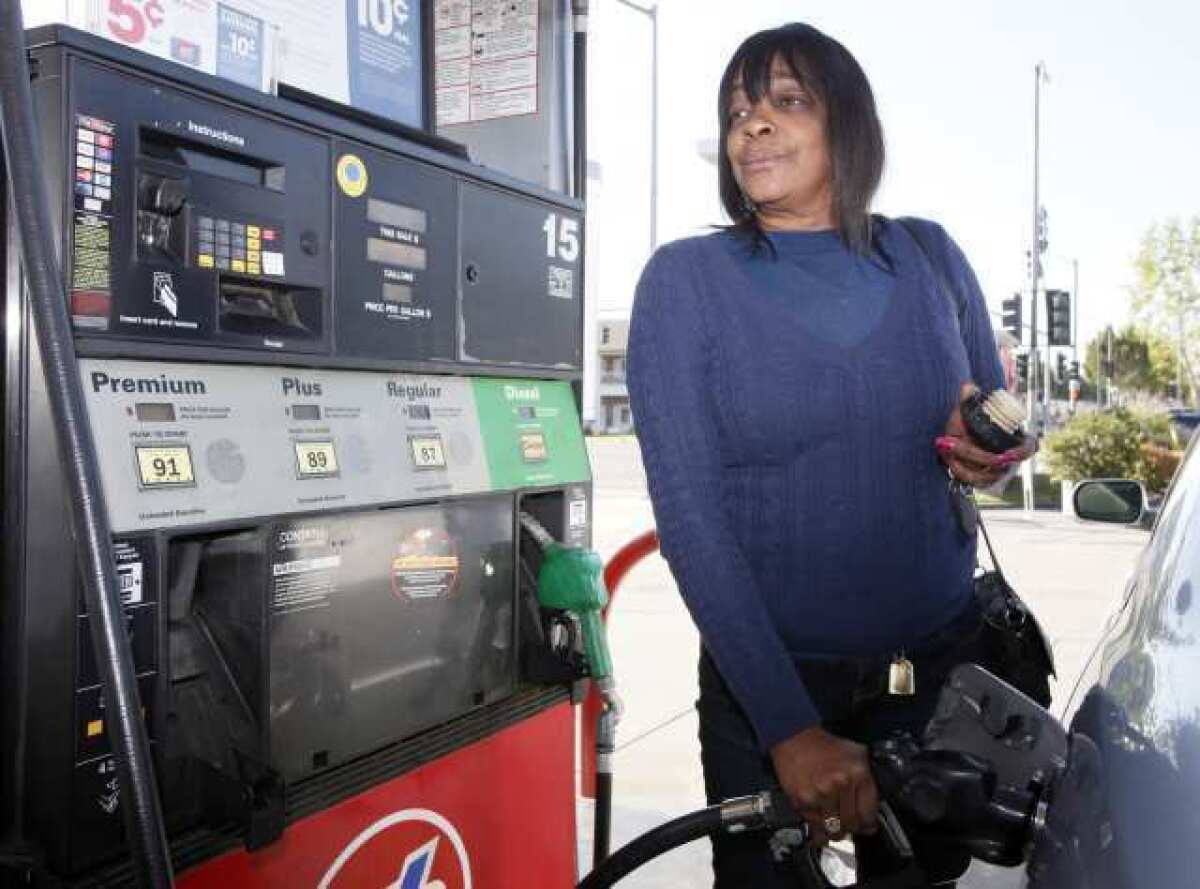McManus: Fuming about gas

When the price of gasoline rises, the supply of hot air expands.
Just look at the recent GOP attacks blaming President Obama for prices that exceed $4 a gallon in some parts of the country.
Not only is Obama responsible, according to some Republicans, he’s downright pleased. As Mitt Romney put it last week to Fox News, “There’s no question that when he ran for office, he said he wanted to see gasoline prices go up.”
But there are some problems with Romney’s statement. First, it’s false. Obama never said he wanted to see gasoline prices go up — although it’s true that his Energy secretary, Steven Chu, once argued that higher prices would be good for conservation. (That was when Chu was a physics professor; once he became a Cabinet secretary, he recanted that view.)
Second, Obama’s policies in office haven’t held down the oil supply or pushed prices up; U.S. oil output is at its highest point since 2003. Yes, Obama imposed a moratorium on deep-water drilling in the gulf after the BP oil spill in 2010, but the moratorium has been lifted and BP is drilling off Louisiana again. True, Obama hasn’t opened as much federal land to drilling as the energy industry wants, but even if he had, that wouldn’t ease prices in the short run.
Third, and most important, the president doesn’t set the price of gasoline; the global market does. Over the long term, the price of crude oil has been pushed up by booming demand from developing countries such as China, which has doubled consumption in the last 10 years and is on the way to doubling it again. In the short term, oil prices have also been pushed up by wars and rumors of wars in the Middle East, including fear that an escalating standoff with Iran could disrupt oil shipments from the Persian Gulf.
That’s why gasoline prices have risen all over the world, not only in the United States. Germany and Britain aren’t ruled by Barack Obama, but that hasn’t spared them from price increases.
Of course, Obama can’t be too surprised by the GOP attacks. After all, when he ran for president in 2008, he blamed then-President George W. Bushfor high gasoline prices, just as his opponents are blaming him now.
It’s no wonder the president has spent so much energy recently promoting himself as a friend of domestic production. Last week, he hopscotched around the nation’s oil patch for a series of photo opportunities (derricks, pipelines, solar panels), arguing along the way that he’s in favor of more energy.
“We’ve quadrupled the number of operating oil rigs to a record high,” he said at an oil field in New Mexico.
“We’ve added enough new oil and gas pipeline to encircle the Earth,” he said at a construction site in Oklahoma.
Like most politicians, in other words, Obama sometimes tries to have it both ways.
He pleased environmentalists last year by blocking permission for a new pipeline from Canada’s shale oil fields to the refineries of Texas. But last week, safe from any primary challenges on his left, he signaled that the pipeline might get his OK after election day. “We’ll be happy to review future permits,” he said as environmentalists howled.
He tried to take credit for allowing a Canadian pipeline firm to begin building the southern leg of the pipeline from Oklahoma to Texas, even though the federal government didn’t really have a say in the matter.
America’s voters, subjected to these gas fumes from both sides, have reacted remarkably calmly, and arguably more sensibly than most of the politicians who would lead them.
Surveys show that most Americans don’t blame Obama for high gas prices, though they would like him to do something to fix the problem. (Hence the president’s trip to the wilds of Oklahoma and New Mexico.) Most voters say they’re in favor of the Republican demand for increased oil production, but they also support the Democrats’ desire for more conservation, more fuel efficiency and more investment in alternative energy sources such as solar or wind power.
Is there anything a president can do to affect the price of gasoline over the long run? In fact, says David G. Victor, an energy scholar at UC San Diego, there is one thing: “innovation.”
“The most interesting changes in the energy market over the last 10 years have come about because of unexpected technological innovation,” he told me, pointing to the new techniques for extracting natural gas and oil from shale — gas and oil that were once inaccessible.
“Long-term innovation on both the supply side and the demand side can really make a difference,” he said. By demand side, he meant measures such as increased fuel efficiency in vehicles and power plants that are actually driving U.S. oil consumption downward.
“That’s the one place where domestic U.S. policies can play an effective role,” he said.
Last week, Rep.Paul D. Ryan(R-Wis.) unveiled a new Republican budget proposal that Romney and other GOP candidates quickly endorsed. Ryan’s budget would eliminate federal subsidies and tax breaks for alternative energy firms and would slash funding for energy research.
Obama, on the other hand, wants to continue funding alternative energy projects but end tax breaks for oil and gas drilling. That should give voters a nice, clear choice on energy issues when they decide which party to support in the fall.
More to Read
Start your day right
Sign up for Essential California for news, features and recommendations from the L.A. Times and beyond in your inbox six days a week.
You may occasionally receive promotional content from the Los Angeles Times.







